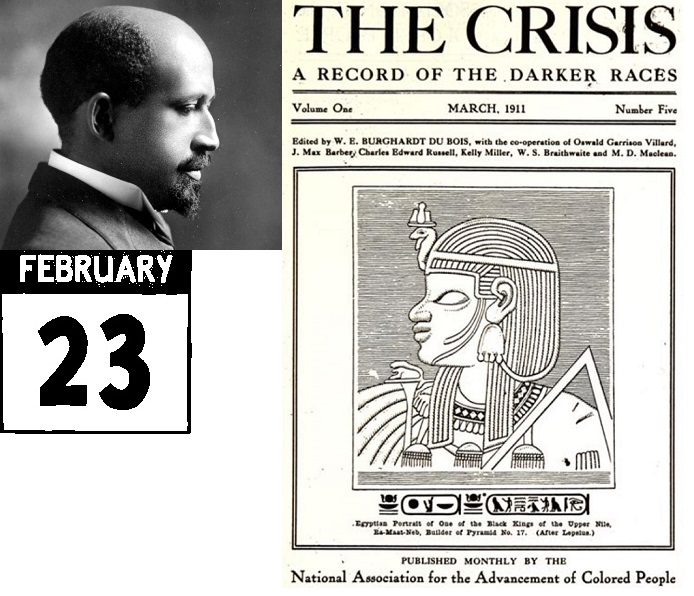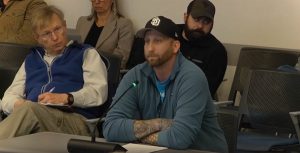On this day in 1868: Celebrating the life of W. E. B. Du Bois
7 min read
Feb. 23 is the birth date of one of America's greatest public intellectuals, W. E. B. Du Bois.
On Feb. 23, we celebrate the birthday of one of America’s great public intellectuals, W. E. B. Du Bois.
[00:00:08] Eric Richardson: A lot of the questions of the 20th century that he was very eloquent and laid out very clearly, we are still dealing with. And it seems as though, because there is a disconnect between our intelligentsia and the community, we really are behind the times when it comes to someone like that.
[00:00:27] At the time of Dr. Du Bois’s birth in 1868, the Civil War had just ended. And he was born in the Northern part of the country. As an African person, we know that African peoples and enslavement existed in the Northern parts of our country and the Western parts of our country and the Southern parts. We think of it as a Southern institution but in fact, many of the ports, Boston and other ports in north, thrived on this trade for 100 years, 200 years. And there is a deep connection with Black people, with African peoples, and the formation of the United States and many of our cities.
Thank you for supporting
local citizen journalism
[00:01:11] And so Dr. Du Bois is known as one of the first African-Americans to gain his PhD early on, in 1895. He is also a brother who was able to write a book after his studies early on the early 1900s entitled The Philadelphia Negro in which he described many of the living conditions and phenomenons in the Black community and really was looking as a case study as to what is going on. And so it was an analysis and he went on from there.
[00:01:46] Many people may not know that he went on to eventually be an early supporter and founder of the idea of pan-African consciousness, the idea that African peoples in the United States do have a profound connection with Africa, and in order for us to understand ourselves we need to have an understanding of Africa. He was one of the first to really delve into the idea of making sure that we had a true connection and understanding. And that was really demonstrated when he published his work, The Souls of Black Folk in 1903.
[00:02:25] And he describes basically the idea that African peoples in America were living in a modern sense in this modern condition that we found ourselves, but that we also have our own spiritual and historic sense, and we live through our memory and through our ancestors. And so it’s a two-ness that we have to do, there was a poem once that talked about the mask—‘We Wear The Mask,’ you know, so you put on this thing and exist in an environment that is not your own.
[00:03:01] And many of his thoughts were in opposition to other Black thinkers who were more about, ‘We should just be satisfied with who we are now,’ with the ‘Be hard workers,’ you know, ‘Fit in. Our connections with Africa are not as important as forging new identities going forward and new strategies.’ And so, that was a split that did exist early on, in the 20th century, within the Black community. And it’s very interesting that Marcus Garvey and Du Bois in many ways have more in common than Du Bois or, say, Booker T. Washington.
[00:03:37] He was also one of the founding members of the NAACP. Definitely the NAACP has been one of the great assets that the nation and the Black community has had, but it’s still to this day underutilized and really not as critical with its analysis and its strategies as Dr. Du Bois would have liked, and in fact, he had departed from the NAACP, I think, two different times, you know, and by the end of the life, he, for sure he was not part of the NAACP because there was that idea of conservatism in the Black community and more of a revolutionary Afrocentric type of idea. And I think that Du Bois in many ways was a forerunner of that idea.
[00:04:24] John Q: Eric said his analysis encompassed labor, liberations, and the coming environmental crisis.
[00:04:31] Eric Richardson: All through the 20th century the conversation was about unionized labor, was about how can we bring more power to the people? And that was about the 20th century. And it so happened that that had much to do with African peoples’ movements and liberation, but women’s, peoples’ movements and liberations, native peoples’ movements and liberations in the 20th century.
[00:04:55] Yet at the same time, we had a government structure that foresaw the environmental catastrophe that their policies were going to do and did nothing about it while at the same time, moving away from any policies that were about social welfare.
[00:05:12] And so, when you listen to a brother like Du Bois and many of those people coming from the African family, it was all about how do we bring welfare and balance, you know, and a little more righteousness and moral centeredness to our policies because that, of course that’s what the formerly enslaved people in the United States would be asking for. Policies that said it was okay to be enslaved and the ideas and the spirit that said it was okay, would be vanquished, but as we know, those things have not. And when I say vanquished from one’s soul, the person is left whole and better when you get rid of these negative spirits and negative conceptions of how we can treat one another and why. And so I think that Du Bois really put a lot on the plate in the earliest 20th century and we have not even dealt with what he has presented.
[00:06:10] John Q: Du Bois was the editor of The Crisis magazine.
[00:06:14] Eric Richardson: And the very first cover of The Crisis magazine is a picture of an ancient Egyptian person. And it says, Know thyself. And so we have yet academically, even, to connect ourselves with Black Africa, with our own civilizations, and with the tools and things that we have within us, through ancestry, that we bring forth. We have yet to really identify them, even though they’re in full display and use.
[00:06:42] But the thing is, when you do identify them, it’s all about love. It’s all about community. It’s all about sharing. And this is a way of life that I think that we are trying to talk about and that we’re going to need more as we have more and more demographic change, as we have more people, we have to be more social.
[00:07:03] John Q: Du Bois was an early champion for human rights. Shortly after the United Nations was formed, Du Bois submitted an ‘Appeal To The World’ that human rights were being violated in the United States of America.
[00:07:16] Eric Richardson: The formative ideas of the United Nations come from the ideas of resistance and of slavery and colonialism. There’s no difference. And in fact the slavery, the system in the United States was just really one of the most profitable colonial movements from the colonial era. So it itself is part of colonialism. You know what I’m saying? And so there’s no difference. When Du Bois is saying, ‘We need to address what’s happening to African peoples in the United States,’ guess what? That was happening wherever the colonial system was, and not only African peoples: The Southeast Asian peoples, in the Americas, people in the islands, in the Pacific, all these peoples, and so there’s only one movement and it is about human rights. And the African who was enslaved in the Americas has a very clear picture of what it is to not have human rights. And then in a situation where this law of the land speaks about the glories of equality and you know, and liberty. And so that dichotomy was very clear and therefore the solution is even clearer.
[00:08:30] But that was 100 years ago and we’re behind schedule because there’s been opposition the whole time. And in fact, what we’re talking about today is why you had a Jan. 6th event—because people are still not willing to listen to what Dr. Du Bois and people who appreciate human rights and the United Nations are talking about.
[00:08:55] So at the end of Dr. Du Bois’s life, he had actually left the United States of America and had been welcomed by the country of Ghana to do an academic project of writing a new encyclopedia on the life of African peoples, Africa, and The Diaspora. And so he died doing that project in his mid-90s. We appreciate him. And I just hope that folks take the time to look at his history because it was very valuable for our country and many of his considerations have yet to be fulfilled.
[00:09:28] John Q: Eric Richardson celebrates the life of one of our greatest Americans, W. E. B. Du Bois.






